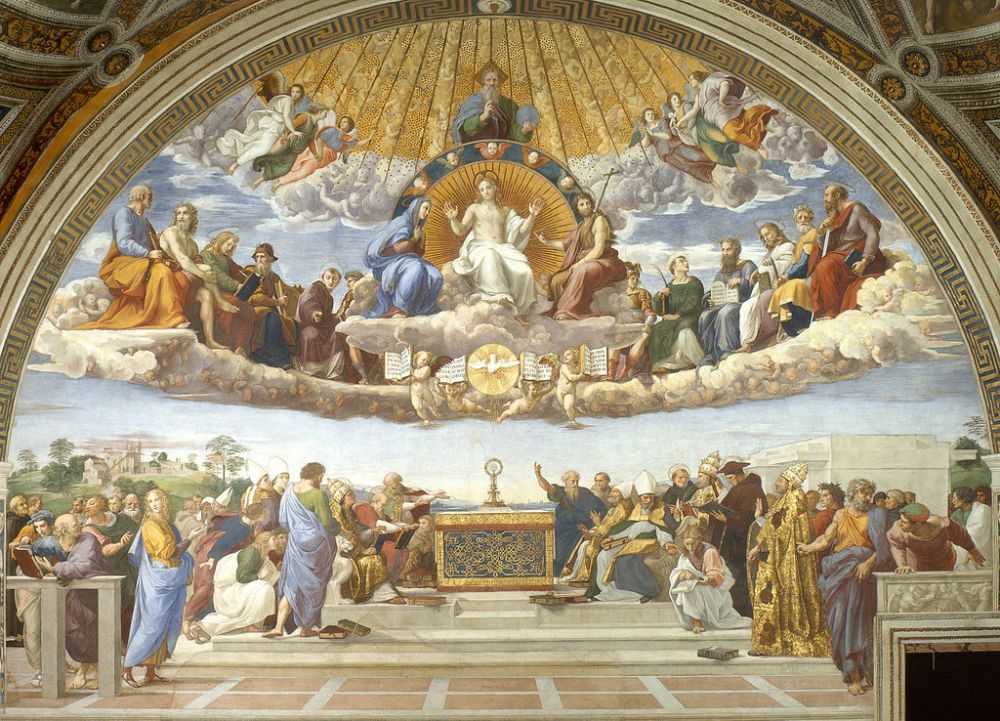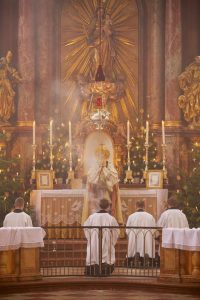Feast Of Corpus Christi

(Saint Peter Julian Eymard)
I. THE TESTIMONY OF THE CHURCH
“Ecce Agnus Dei.” Behold the Lamb of God. (John i. 36.)
Saint John the Baptist’s mission on earth was to announce the coming of the promised Savior, point Him out to men, and prepare the way for Him. The Church fulfills the same mission with regard to Jesus Eucharistic, a more extensive and lasting mission, which takes in every age and country. She carries out her mission by manifesting Jesus in the Blessed Sacrament, by preaching Him by word, and also by the testimony of her faith and works, — a silent preaching, but just as eloquent as the first.
First, The Church presents herself before us with the words of Jesus on her lips; she repeats and explains them with an authority equal to that of the Savior: “This is My Body. This is My Blood.”
She tells us, and we must believe that, by the Divine power of these sacramental words, taken in their direct and natural sense, Jesus Christ becomes truly, really, and substantially present in the Most Blessed Sacrament of the altar under the appearances of bread and wine.

She tells us, and we must believe that, by His omnipotence, Jesus Christ has changed the substance of bread into His Body and the substance of wine into His Blood, and that His Soul and Divinity accompany the presence of His Body and of His Blood.
She tells us, and we must believe that the Divine work of Transubstantiation is forever being wrought in the Church through the priesthood of Jesus Christ, invested by Him with His own power when He instituted it with these words: “Do this for a commemoration of Me.”
And ever since the Last Supper, the Church has been proclaiming this belief down through the ages.
Her Apostles have had but one voice, her teachers but one doctrine, her children but one belief, one love for the God of the Eucharist.
How majestic is the voice of the whole Christian people! How touching and beautiful is the harmony of their praise and their love!
Every true child of the Church wants to bring to the feet of the Divine King present on the altar a tribute of homage, a token of his affection, – one brings gold, another myrrh, and all bring incense. Everyone wants to have a place in the court and at the table of the God of the Eucharist.
The very enemies of the Church, the schismatics, and nearly all the heretics believe in the presence of Jesus in the Eucharist. . . . The truth is that one must be quite blind to deny the existence of the sun, quite ungrateful to ignore and despise the love of Jesus perpetuating His Presence in the midst of men.
As for us, we believe in the love of Jesus, and we know that nothing is impossible to the love of a God.

Secondly, to the testimony of her word the Church adds the testimony of her example and practical faith. As John the Baptist, after having pointed out the Messias, cast himself at His feet to prove the liveliness of his faith, so the Church devotes a solemn worship, her entire worship to the adorable Person of Jesus Whom she manifests to you in the Most Blessed Sacrament.
She adores Jesus Christ as God, present and hidden in the Divine Host. She pays Him the honor due to God alone; she prostrates herself before the Most Blessed Sacrament like the heavenly court before the majesty of God. Distinctions of rank are not in order here: great and small, kings and subjects, priests and people instinctively fall to their knees before the God of the Eucharist.
It is the Good God! The Church is not content to attest her faith by adoration alone; to that she adds public and magnificent honors.
The splendid basilicas are the expression of her faith in the Most Blessed Sacrament. She did not wish to build tombs but temples, a heaven on earth in which her Savior and God might find a throne worthy of Him.
With a delicate and jealous attention the Church has regulated Eucharistic worship to its minutest details. She does not rely on anyone to take in hand the matter of honoring her Divine Bridegroom; for everything is important, significant, and Divine, when there is question of the Real Presence of Jesus Christ.
She wants to consecrate to the royal service of Jesus all the most genuine and precious things in the
world.
In her liturgy everything is related to this mystery; everything takes on a spiritual and heavenly meaning; everything has a property of its own and contains some special grace.
How easy it is for the soul to recollect herself in the solitude and silence of a church! A gathering of Saints on their knees before the tabernacle causes us to exclaim: “There is more than Solomon, more than an angel here!” Jesus Christ is here before Whom every knee bends, of those that are in Heaven, on earth, and under the earth.
In the presence of Jesus Christ in the Most Blessed Sacrament, all greatness disappears, all holiness humbles itself and comes to nothing.
Jesus Christ is there!
II. THE TESTIMONY OF JESUS CHRIST
“Videte quia Ego ipse sum.” See, . . . that it is I Myself. (Luke xxiv. 39.)
THE Church has told us: “Jesus Christ is truly present in the Sacred Host.” Jesus Himself manifests His presence in two ways: interiorly and publicly.
- INTERIOR MANIFESTATION
The interior manifestation takes place in the soul of the communicant. Jesus works a threefold miracle in the one that receives Him.
First, a miracle of reformation. Jesus gives the communicant an assured mastery over his passions. In fact, it is the same Jesus Who said, “Have confidence, I have overcome the world,” and Who also said to the tempest, “Peace, be still.” And now to the proud man, to tire miser, to the man who is tormented by the revolt of his senses, to the man who is a slave to his evil inclinations, He says, “Loose him, and let him go.”
And the communicant feels stronger. On rising from the Holy Table we can say with Saint Paul, “In all these things we overcome because of Him that hath loved us.”
There has been a sudden change, the sudden flaming of a fire. But if Jesus Christ were not in the Sacred Host, no such great wonders would be wrought. It is harder to reform nature than to form it.
Man finds greater difficulty in correcting or overcoming himself than in performing some exterior good deed, be that deed heroic. Habit is second nature.
The Eucharist alone, at least according to the ordinary course of events and of facts based on experience, gives us the power to reform the bad habits that lord it over us.
Secondly, a miracle of transformation. There is only one means of changing a natural life into a supernatural one; that is the triumph of the Eucharist, in which Jesus Christ Himself sees to the education of man.
The Eucharist develops faith in us. It elevates, ennobles, and purifies love in us. It teaches us to love. Love is the gift of self. Now, in the Eucharist Jesus gives Himself in His entirety; He supplements His counsel with His example.
The Eucharist transforms even our exterior. It imparts to the body a certain charm and beauty which is a reflection of the beauty within. There is in the countenance of the communicant a certain transparency of the Divine; in his words a gentleness and in his actions a sweetness that indicate the presence of Jesus Christ. This is the good odor of Jesus.
Thirdly, a miracle of strength, which leads one to self-forgetfulness and self-sacrifice. A man suffers a misfortune; he draws from the Eucharist a strength superior to his misfortune. In the midst of adversity, calumny, and worries the Christian finds peace and calm in the Eucharist. The faithful soldier of Jesus overcomes temptation and the assaults of men and of Hell through Holy Communion.
In vain will you seek this superhuman strength outside the Eucharist. But if the Eucharist gives that strength, then Jesus, the Savior, the God of strength, is really there.
Such is the interior evidence that Jesus Christ gives of His presence in
the Most Blessed Sacrament. - PUBLIC MANIFESTATION
Sinners and profaners of this august Sacrament have been punished publicly for their temerity; Jesus was manifesting His justice.
Scarcely had Judas sacrilegiously received the Body of his God than “Satan entered into him.” Before this sacrilegious Communion the devil merely tempted him; after it the devil took possession of him: “Introivit in eum Satanas.” – “Satan entered into him.”
Saint Paul attributed the lethargic sleep of the Corinthians and their apathy for good to their lukewarm or sacrilegious Communions. “Therefore are there many infirm and weak among you, and many sleep.”
History records terrible instances of unworthy communicants, smitten without warning by the justice of our Lord Whom they were insulting in the Eucharist.
Jesus manifests also therein His power over demons. When demons, who had resisted every other form of exorcism, were confronted with the Sacred Host, they howled with rage and yielded to the presence of their God.
Once at Milan, after the “Pater Noster” of the Mass, Saint Bernard placed the chalice and paten on the head of a possessed woman, and the devil left her in a fury, uttering frightful howls, “Jesus Christ, the Good God is there!”
So many sick people have been cured by the Eucharist! These facts are not all known, but history proves it, the Blessed Sacrament is a cure for all infirmities.
Saint Gregory of Nazianzen relates this touching incident. His sister had been ill for a long time. One night she arose, went to kneel before the Holy Tabernacle, and in the fervor of her faith said to our Lord: “O my Lord, I will not rise from here until Thou hast cured me.” She stood up and was cured.
Lastly, our Lord has appeared so many times under divers forms! From time to time He is pleased to renew the miracle of Thabor. These manifestations are not necessary since we have the word of Truth itself as a guarantee. They merely prove that the words of Jesus Christ have indeed effected what they signified.
Yes, Lord Jesus, we believe that Thou art present in the Most Blessed Sacrament, truly and substantially present; increase, increase our faith . . . .